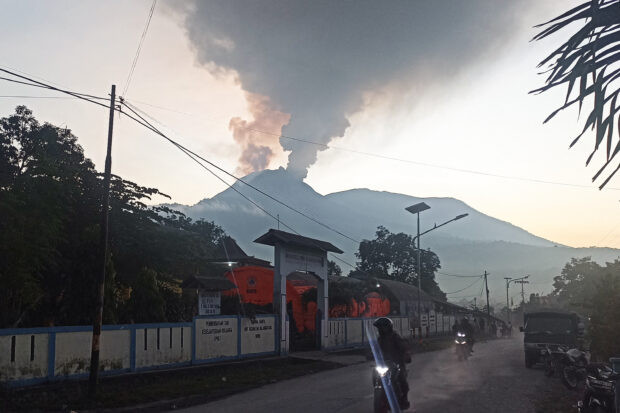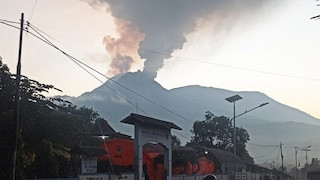Indonesia’s Mount Lewotobi Laki Laki volcano erupted violently around midnight on Monday, November 4, spewing thick brownish ash as high as 2,000 meters (6,500 feet) into the air. Hot ash rained down on several villages, burning down houses, including a convent of Catholic nuns, and triggering a wave of evacuations. The eruption, which followed a series of smaller eruptions in recent days, has left at least 10 people dead and forced thousands of others to seek refuge in emergency shelters.
Impact of the Eruption
The eruption’s impact was felt across a wide area, with volcanic material being thrown up to 6 kilometers (3.7 miles) from the crater. This resulted in a thick blanket of ash covering nearby villages and towns, forcing residents to flee their homes in the dark. The local disaster management agency confirmed that at least 10,000 people have been affected by the eruption across six villages in Wulanggitang District and four villages in Ile Bura district.
Search and Rescue Efforts
Rescue workers are still searching for bodies buried under collapsed houses. The National Disaster Management Agency’s spokesperson, Abdul Muhari, confirmed that all the bodies, including a child, were found within a 4-kilometer (2.4-mile) radius of the crater. The agency has also been working tirelessly to provide support to the displaced population, setting up temporary shelters in schools and coordinating relief efforts.
Increased Alert Status and Evacuation Zone
The country’s volcano monitoring agency, in response to the increasing frequency of eruptions, has raised the volcano’s alert status to the highest level and more than doubled the exclusion zone to a 7-kilometer (4.3-mile) radius. This decision was made after midnight on Monday, following the eruption that spewed a large volume of ash.
A Nun's Account of the Eruption
Agusta Palma, the head of the Saint Gabriel Foundation that oversees convents on the island, shared a harrowing account of the eruption. He stated that a nun in Hokeng village died during the eruption, and another is still missing. “Our nuns ran out in panic under a rain of volcanic ash in the darkness,” Palma said. Images and videos circulating on social media vividly depict the devastation caused by the eruption. Homes in villages like Hokeng, where hot volcanic material ignited fires, are seen covered in ash up to their rooftops.
Mount Lewotobi: A Husband and Wife Volcano
Mount Lewotobi Laki-laki is one of a pair of stratovolcanoes in the East Flores district of East Nusa Tenggara province, known locally as the husband and wife mountains. “Laki-laki” means man in Indonesian, and its mate is Lewotobi Perempuan, or woman.
A History of Volcanic Activity
This is not the first time Mount Lewotobi Laki Laki has erupted. In January 2024, the volcano spewed thick clouds of ash, forcing the government to close the island’s Frans Seda Airport. While no casualties or major damage were reported at that time, the airport remains closed due to ongoing seismic activity. The latest eruption, however, has been significantly more powerful, resulting in casualties and widespread displacement.
Understanding the Cause of the Eruption
The Energy and Mineral Resources ministry’s head of Geology Agency, Muhammad Wafid, attributed the intensity of the recent eruption to a blockage of magma in the crater. This blockage, he explained, reduced detectible seismic activity while building up pressure. “The eruptions that occurred since Friday were due to the accumulation of hidden energy,” Wafid said.
Indonesia's Ring of Fire
Indonesia, an archipelago of 280 million people, is situated along the “Ring of Fire,” a horseshoe-shaped series of seismic fault lines around the Pacific Ocean. This geographical location makes the country highly susceptible to earthquakes, landslides, and volcanic activity. The recent eruption of Mount Lewotobi Laki Laki is a stark reminder of the region's volcanic nature. The country is actively monitoring the situation, providing support to those affected, and working to ensure the safety of residents living near the volcano.
A Second Eruption in Recent Weeks
The eruption of Mount Lewotobi Laki Laki marks the second volcanic eruption in Indonesia in as many weeks. West Sumatra province’s Mount Marapi, one of the country’s most active volcanos, erupted on October 27, spewing thick columns of ash at least three times and blanketing nearby villages with debris, though no casualties were reported. The two eruptions underscore the ongoing volcanic activity in the region, highlighting the need for preparedness and ongoing monitoring efforts to mitigate potential risks.


















